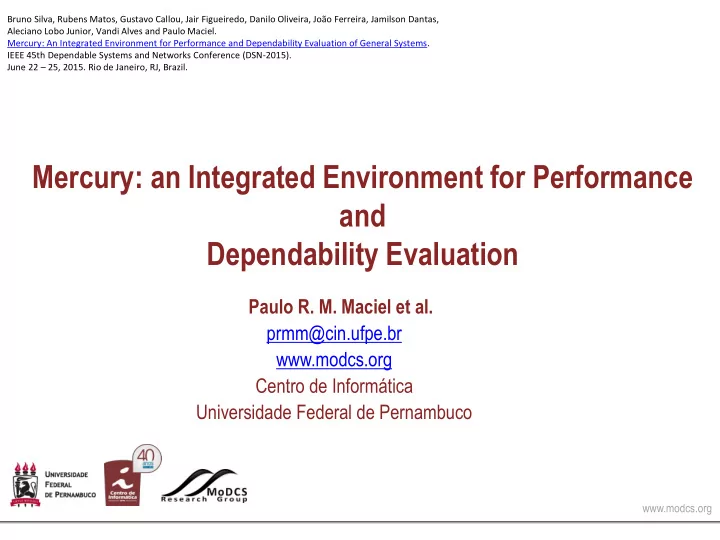

Bruno Silva, Rubens Matos, Gustavo Callou, Jair Figueiredo, Danilo Oliveira, João Ferreira, Jamilson Dantas, Aleciano Lobo Junior, Vandi Alves and Paulo Maciel. Mercury: An Integrated Environment for Performance and Dependability Evaluation of General Systems. IEEE 45th Dependable Systems and Networks Conference (DSN-2015). June 22 – 25, 2015. Rio de Janeiro, RJ, Brazil. Mercury: an Integrated Environment for Performance and Dependability Evaluation Paulo R. M. Maciel et al. prmm@cin.ufpe.br www.modcs.org Centro de Informática Universidade Federal de Pernambuco www.modcs.org
Aims • depicting Mercury tool, • reasons for proposing another tool, • functionalities supported, • current constraints, and • briefly mentioning next planned supported functionalities. www.modcs.org
Agenda • Context • Motivation • Architecture: an overview • Brief description of models’ functionalities supported • Additional supported functionalities But, before... www.modcs.org
where we are located Our research group is part of Centro de Informática at UFPE. UFPE is located at state of Pernambuco at northeast region. www.modcs.org
Context Research in the group: our main research interest is devoted to formal timing modeling and evaluation of systems: performance, dependability and energy consumption www.modcs.org
Context We have devoted our efforts to study many practical domain problem, emcompssing: cloud computing sustainable data centers mobile system workload generation for capacity planning of servers fault injection and monitoring in cloud computing energy consumption in embedded system convergent networks logistic distribution production systems policies of emergency call center systems www.modcs.org
Motivation • Over the years, our group has used many academic and commercial tools. – Some academic tools we have adopted in our group: INA, Design CPN and CPN tools, Great SPN, TimeNet, SHARPE … • If there are so many tools, why should I implement another tool? – Cons. (some) : • There are many good tools already available • It is likely the your (“first”) results should be worse than those provided by these estabilshed tools – Pros: • It is an objective mean for keeping your previous reseach results “alive” • Allow practical/real connection between consecutive reseach works • Having control over the products (software, models, methods etc) conceived and implemented in the group by graduate students, that, after finishing their respective research projects, start a new phase in their lives, • Learning (in depth) of the respective methods . www.modcs.org
Motivation • My decision was: implement it. • So we began implementing the tool in 2008 by conceiving, specifiying and coding a simulation kernel for SPN. • From then on many functionalties and models have been inclueded and are now supported by the tool. www.modcs.org
Architecture: an overview www.modcs.org
Markov Chain view Editing Analysis www.modcs.org
Steady State Analysis Markov Chain view www.modcs.org
Markov Chain view Transient Analysis www.modcs.org
Sensitivity Analysis Markov Chain view www.modcs.org
Markov Chain view Script Mathematica file generation www.modcs.org
Token game SPN view Editing Structural Analysis www.modcs.org
SPN view Evaluation www.modcs.org
RBD view Editing www.modcs.org
Evaluation RBD view www.modcs.org
Evaluation RBD view Experiment www.modcs.org
RBD view Evaluation Partial derivative Sensitivity analysis www.modcs.org
RBD view Evaluation Partial derivative Sensitivity analysis www.modcs.org
RBD view Evaluation Importance measures www.modcs.org
RBD view Evaluation Logic and structural functions Qualitative analysis www.modcs.org
RBD view Script generation www.modcs.org
Miscellaneous www.modcs.org
Some current constraints and few planned functionalities • Hierarchical evaluation (at this point) only allows automatically refining one sub-model. – This constraint should be removed in next versions. • Hierarchical multi-model sensitivity analysis not currently supported. – On going work • Enhancing the script language for taking into account other control structures • Considering other importance measures • Keep fixing bugs… • … www.modcs.org
Final comments • Mercury is an academic tool. • The executable code is available for academic use. • If you would like to try it out, I encourage you to access www.modcs.org and go to Tools. From there, you will get a form, sign it and download it. • There, you will also find a detailed manual. • Presently, we have a group of 8 graduated students working on it. • We very much appreciate if let us know about bugs and improvements, but we cannot guarantee maintenance support. www.modcs.org
Thank you! Paulo Maciel www.modcs.org
Recommend
More recommend